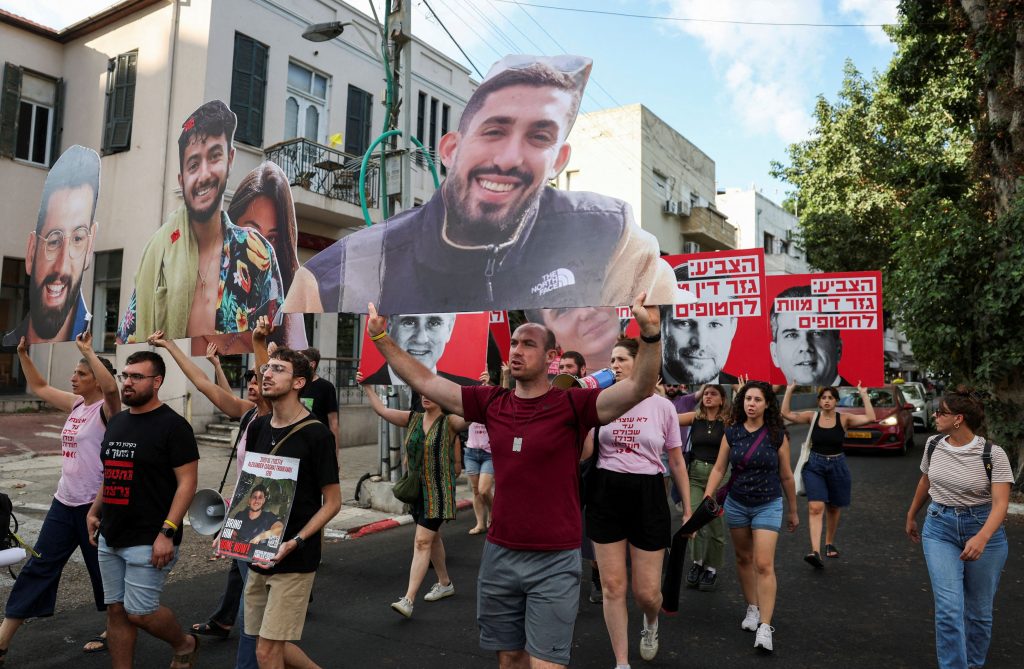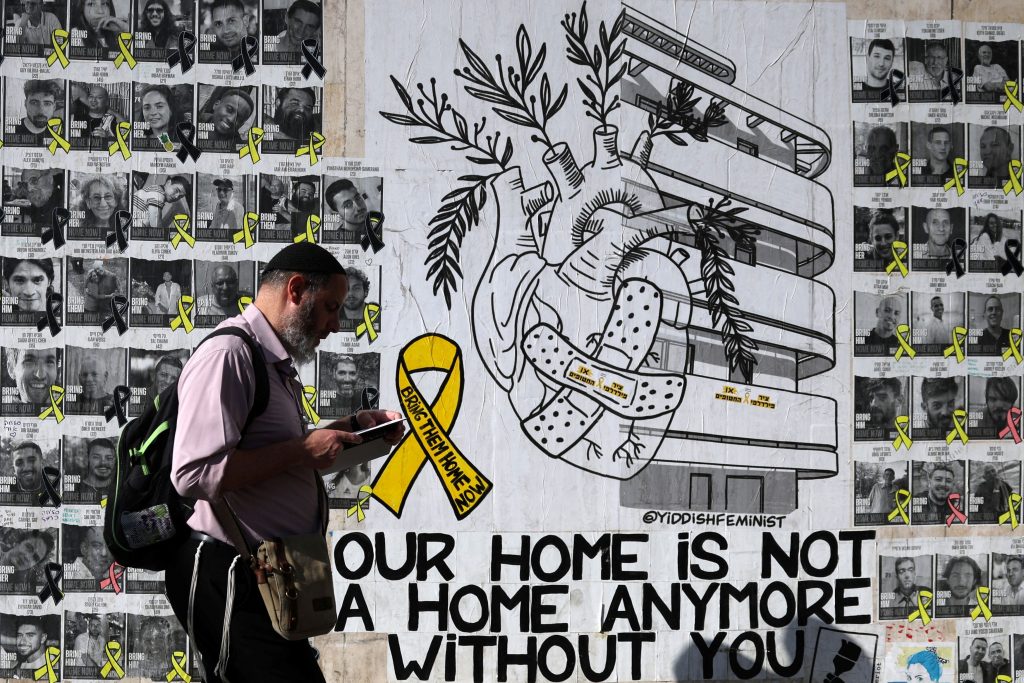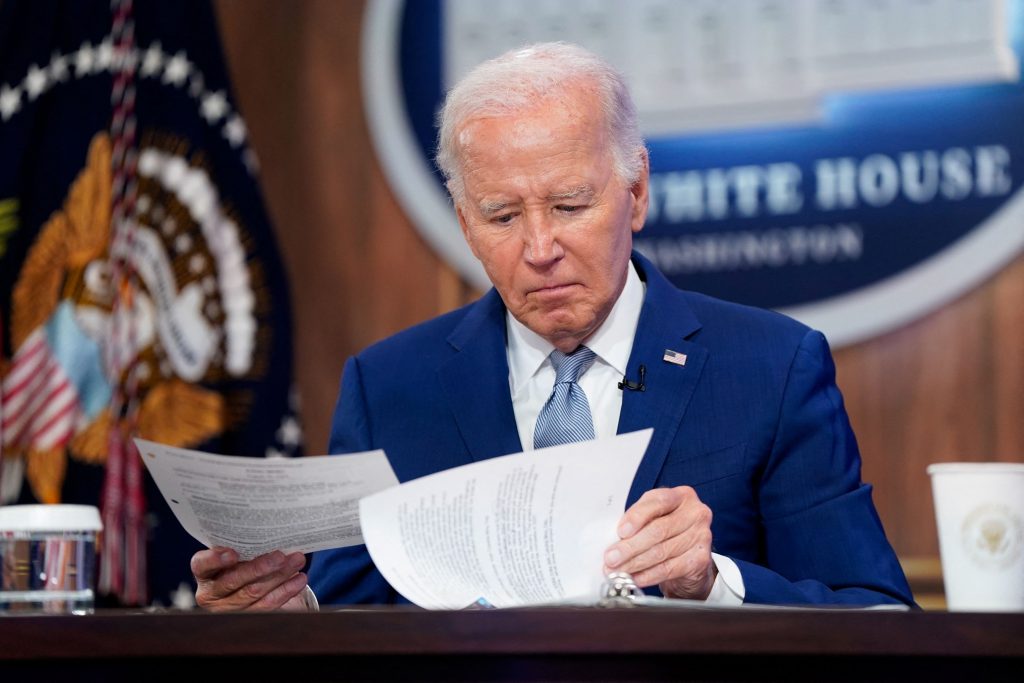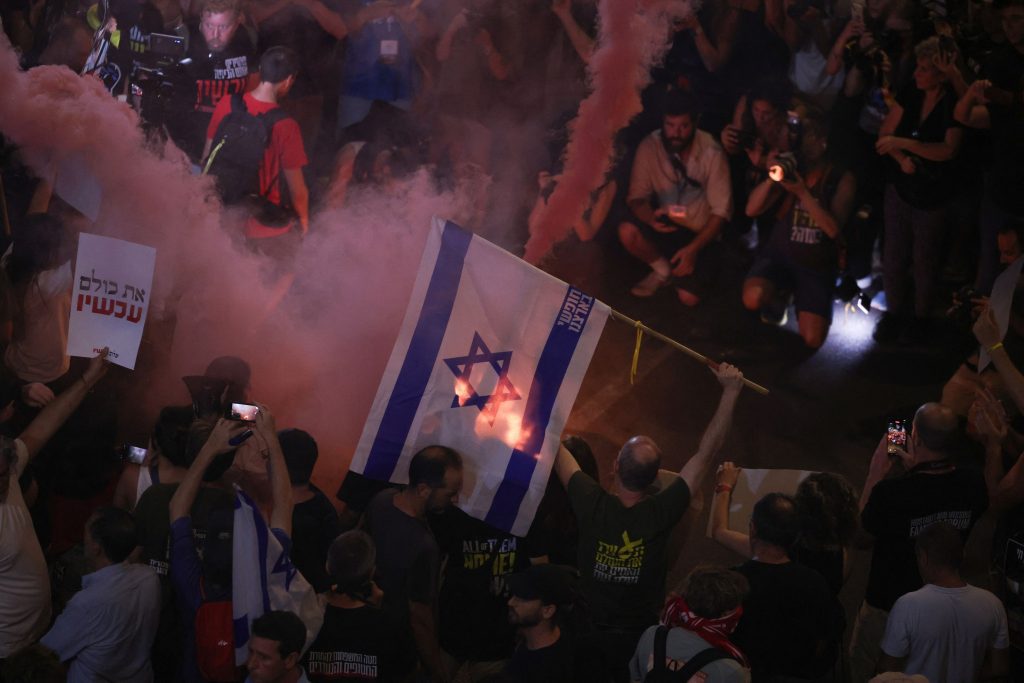The killing of an American-Israeli hostage has added new urgency to the White House’s attempt to halt the fighting in Gaza with an updated final proposal designed to get Israel and Hamas to reach a cease-fire agreement.
But administration officials acknowledge this proposal might not be the last, particularly with seven American citizens still among the Hamas-held hostages.

People protest to show support for the hostages who were kidnapped during the deadly October 7 attack, amid the ongoing conflict in Gaza between Israel and Hamas, in Tel Aviv, Israel, September 4, 2024. REUTERS/Florion Goga TPX IMAGES OF THE DAY
Hamas’s execution of Hersh Goldberg-Polin , a 23-year-old born in California , along with five other hostages , increased pressure on President Biden and Israeli Prime Minister Benjamin Netanyahu to convince Hamas of the need to pause the fighting and exchange hostages held in Gaza for Palestinian prisoners in Israel. The killings occurred as the U.S., in coordination with Arab mediators, was updating the agreement’s text before presenting it to the warring parties as soon as this week.
U.S. officials said the next iteration is likely to be more detailed than the so-called “bridging proposal” delivered last month, coming after the negotiating parties spent weeks inching closer to a final framework. There is expected to be more specificity on how the hostage-for-prisoner swaps will go, what could trigger a restart in hostilities and how long Israeli forces can remain in the Philadelphi corridor, on the Gaza-Egypt border, to stop Hamas from smuggling weapons into the enclave.
National Security Council spokesman John Kirby told reporters Tuesday that the fresh agreement would “secure the release of the remaining hostages,” lead to “massive and immediate relief for the people of Gaza,” and stop the fighting. He said Biden, who attended a Situation Room briefing on the status of negotiations Monday, is personally invested in the effort.
“The killing over the weekend just underscores the sense of urgency that we have to have in order to get it to closure,” Kirby continued.
Netanyahu, facing hundreds of thousands of protesters at home urging him to make a deal, directed his ire at anyone in the U.S. or Israel trying to force his hand. “No one is more committed to freeing the hostages than me,” he said Monday, restating his demand that Israel control the Philadelphi corridor before striking a bargain. “This is the oxygen of Hamas.”
Hamas leader Yahya Sinwar , the other key player in the talks, also appears reluctant to sign an agreement, U.S. officials have said, even as Hamas insists it wants an indefinite end to the fighting.
“Sinwar seems to have little interest in concluding a deal, is indifferent at best to casualties on the Palestinian side, and may feel that time works in his favor as public and international pressure builds on [Netanyahu] as long as he continues to hold hostages,” said Michael Singh , who served as a top Middle East official in George W. Bush ’s White House.
The U.S. Justice Department on Tuesday announced criminal charges against Sinwar and other militants in connection with the group’s Oct. 7, 2023, attack on Israel, citing the murder of Goldberg-Polin.
“We are investigating Hersh’s murder, and each and every one of the brutal murders of Americans, as acts of terrorism,” Attorney General Merrick Garland said.
Most of the draft deal has been agreed to, U.S. officials said, adding that Hamas was still the least willing to say yes. Negotiators in Washington and other capitals confirm the deal on offer gives Hamas most of what it wanted, with the Israelis making many concessions to reach a bargain.
Netanyahu has also long been a roadblock to reaching an agreement. Earlier on Monday, before attending the Situation Room briefing, Biden responded “no” when asked whether Netanyahu was doing enough to reach an agreement.

A man walks next to memorial pictures of hostages, most of whom were kidnapped during the deadly October 7 attack by Hamas, in Tel Aviv, Israel, September 4, 2024. REUTERS/Florion Goga
But the sticking point over how long Israeli troops can patrol the Philadelphi corridor has halted diplomatic momentum. An earlier version of the accord required Israel Defense Forces to withdraw from “all densely populated areas” of the corridor in Phase One of the deal. During his Monday news conference, Netanyahu said it was a “strategic imperative” for Israel to control that region. Withdrawing forces during any part of the six-week fighting pause would allow Hamas to rearm and rebuild, the prime minister maintained.

REUTERS/Elizabeth Frantz
Netanyahu also faces significant pressure to continue the war against Hamas from his far-right partners, on whom he depends to maintain the ruling coalition.
On Wednesday, Israeli National Security Minister Itamar Ben-Gvir , who is also a member of the security cabinet, which makes decisions about the war, said that he was working to stop negotiations between Israel and Hamas to reach a deal.
“Continuing the negotiations only spurs them to produce more and more terror,” he said, referring to Hamas in a post on X.
Netanyahu’s office declined to respond to a request for comment on Ben-Gvir’s post.
International pressure on Israel has only grown in recent days. The U.K. suspended 30 of 350 arms-export licenses to Israel over fear that the weapons London provides might be used in violation of international law, British Foreign Minister David Lammy said Monday.
The Biden administration is unlikely to follow suit, as it has staunchly resisted withholding arms from Israel during the war except for one shipment of 2,000-pound bombs. State Department spokesman Matthew Miller said Tuesday that assessments on whether Israel was violating international humanitarian law with U.S.-provided weapons would be completed “as soon as possible.”
Kirby, the National Security Council spokesman, suggested that, despite the complications, there was some reason for optimism even if he couldn’t guarantee a deal would get done. “We believe that we can get there,” he said.
The U.S. isn’t likely to walk away from the talks, since it wants the war to end, two senior administration officials said. And analysts closely monitoring the diplomacy agree that negotiations could continue. “The idea that this is a ‘final offer’ lacks credibility unless there is an ‘or else’ for Hamas,” said Singh, now the managing director of the Washington Institute for Near East Policy.
If the U.S. can’t persuade Sinwar to make a deal, he continued, “then this will be just the latest offer, not the last.”

People gather to protest against the government and to show support for the hostages who were kidnapped during the deadly October 7 attack, amid the ongoing conflict in Gaza between Israel and Hamas, in Tel Aviv, Israel, September 3, 2024. REUTERS/Florion Goga
Write to Alexander Ward at alex.ward@wsj.com






